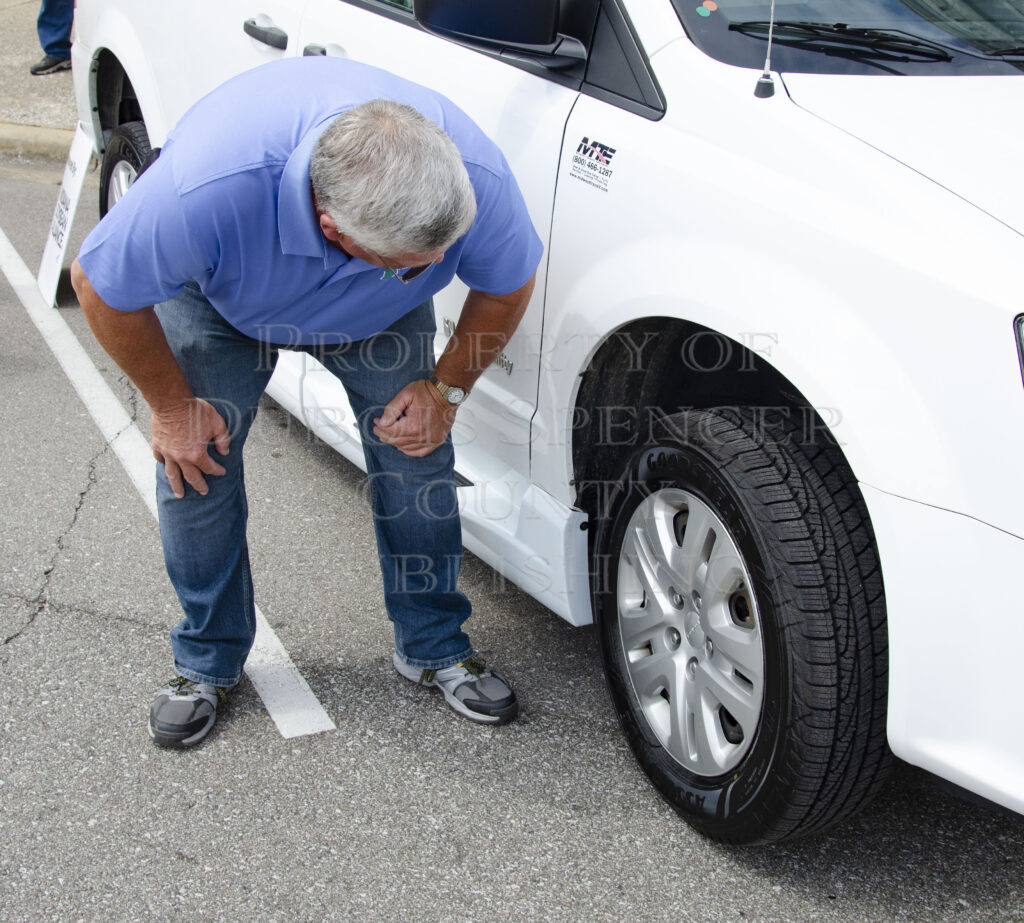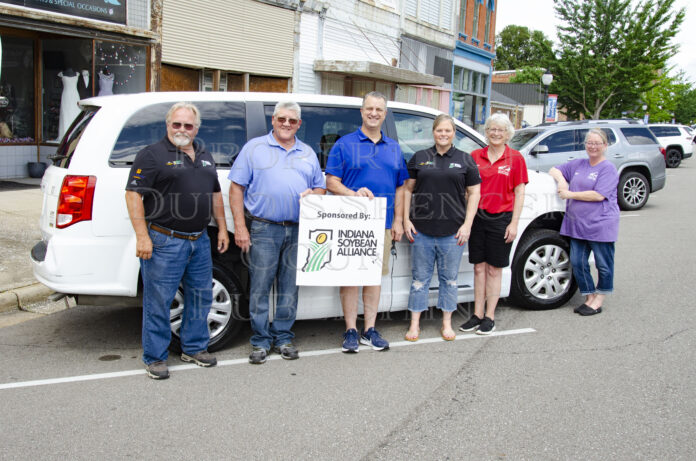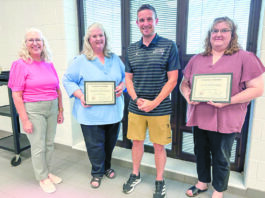By Don Steen
Staff Writer n reporter@psci.net
It was another wet weekend in a wet year, much to the chagrin of farmers laboring to get crops in the fields. While the weather can have a big impact on the timing and yield of a soybean crop, soybean oils can help make tires more pliable and weather resistant, especially in wet or cold conditions. The Spencer County Council on Aging will get a chance to see these benefits in action soon, as one of its seven vans is fully decked out in new tires produced from this homegrown product.
The new tires were donated by the Indiana Soybean Alliance in a ceremony Saturday afternoon, in between bouts of rainfall. The soy-based tires were produced in partnership between the United Soybean Board and Goodyear Tire, and the ISA has awarded four non-profit organizations across the state with sets of tires to suit their needs.
Derika Spaetti, local board director for the ISA, said the use of soybean oils as a substitute for petroleum has many benefits. Goodyear estimates that 8% of a typical tire consists of oil, and the company sells more than 40 million tires in the United States and Canada every year. Spaetti noted that substituting even a fraction of that total with renewable soybean oils can save a great deal of petroleum for other uses.
According to a study by US Soy, soybean oil maintains a significantly lower carbon footprint than other major plant-derived oils, such as rapeseed, palm or sunflower. Goodyear began experimenting with incorporating soybean oil into tires in 2012, and had began selling them in 2017. The company has increased its use of soybean oil by 73% since 2018, and has exceeded its goal of a 25% increase by 2020. Goodyear hopes to fully replace petroleum-based oils by 2040.
Apart from the environmental benefits, that’s good news for farmers. Philip Springstun of the ISA noted that commodity prices are low at the moment, and subject to volatility at the best of times. That’s why the ISA and its national counterpart allocate considerable resources toward researching new applications for their products.
Under the checkoff system, soybean farmers collectively invest a portion of their revenue specifically for research and promotion. In addition to the applicability of soybean oil in tire manufacturing, Springstun pointed to several advances that could open up new market opportunities. These include more soy-based foodstuffs, candles, crayons and other common goods.
As with any new technology, there are some limitations out of the gate. Current soy-based tires are best used on smaller vehicles. In addition, their boost in quality and better handling in inclement weather comes with a higher price point, at least for now.
Springstun noted that demand for soy-based tires is still relatively small, and scaling up production is expensive. Until adoption is more widespread, soy-based tires will likely remain more expensive than alternatives —hence, the ISA’s decision to donate these tires to public institutions for use in fleet vehicles. The more people recognize their benefits, the more incentive there is to produce them at scale.
Spaetti reached out to the Spencer County Community Foundation to see what local organizations might benefit the most from a new set of tires. The SCCOA was an obvious candidate, and Executive Director Angela Turner tossed her organization’s hat in the ring. At the end of the day, the SCCOA was one of only four recipients in the state.
The new tires are particularly welcome, as the SCCOA’s seven-van fleet puts a lot of miles into every month. The organization regularly offers transportation or make deliveries to local senior citizens with few other avenues to get around.
Turner reported the SCCOA made 303 runs last month, adding 11,000 miles collectively across the fleet. The organization keeps 10 drivers on staff, with one current vacancy if any avid motorist is so inclined to pitch in.
Drivers typically take charge of their van’s regular maintenance, including tire rotation and replacement. If Goodyear’s early reports are any indication, the new soy-based tires should more than carry their weight for a good long while, in rain or snow.
Other recipients in Indiana, and other programs across the country, include emergency services and other public-facing vehicle fleets. Spaetti said she was glad that Spencer County could benefit from this round of the program. She also hoped to see other local organizations get a chance to try out the new tires, either by purchasing them from Goodyear or applying for future ISA programs.
More information on Goodyear’s soy-based tires can be found at www.goodyear.com. For more information about the United Soybean Board, go online to www.unitedsoybean.org.
Featured Image: Pictured from left are Gary McDaniel, Philip Springstun, Blake Bunner, Derika Spaetti, Diane Arnold and Angela Turner in front of an SCCOA van decked out with Goodyear’s new soy-based tires.

Philip Springstun of the Indiana Soybean Alliance checks out one of the newly installed tires outside the Spencer County Council On Aging office. The new tires expected to perform better in wet and wintry conditions.




